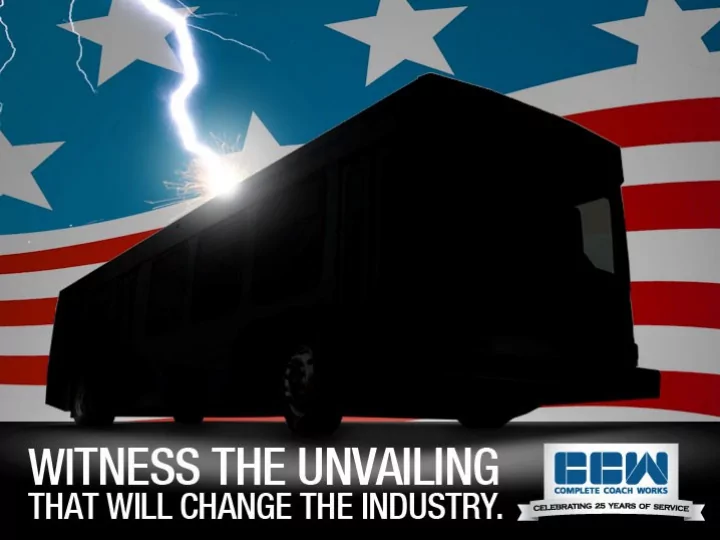

Innovation at Complete Coach Works • The quest for alternative fuel vehicles is gaining momentum and every transit fleet across the North America is looking for solutions • Over the past 25 years, CCW has always pushed the innovation envelop to provide best in class and cost effective solutions to the transit industry.
Commercializing the Green Technology • Zero Emission technology will be successful only if we make it viable and competitive. • Our research started with a defined goal to develop a remanufactured all-electric transit bus which agencies can afford and operate without limitations. • Other all-electric transit buses are expensive and have operational limitations • We invested heavily in research without waiting for any government grants. • The technology will revolutionize transit industry.
Operational Challenges • Diesel Powered buses are major contributors to Green-House- Gas emitting 153 short tons per year per bus • Alternative fuels such as CNG, Propane and LNG do not completely eliminate the Green-House-Gas and NOx emissions • Maintenance costs of Diesel, CNG and hybrid buses consume significant portions of fleet’s operational budgets and are increasing each year • Increasing fuel Costs are extremely unpredictable, hindering fund allocation and the planning process of the fleet • Fleets are facing challenges in recruiting maintenance staff. Switching to an electric propulsion system reduces the strain on maintenance staff.
Capital Investment Challenges • Additional infrastructure and maintenance costs of CNG, LNG and Hydrogen fueling stations add a financial burden on transit authorities already hard pressed by budget cuts • The cost of Diesel-Hybrid buses is nearly twice the cost of a diesel buses • The cost of Hydrogen fuel cell buses is prohibitively expensive. Latest purchase records indicate a price of $2.5 million per bus • Competing pure electric buses provide a 20 mile range and are 3 times the cost of a normal CNG bus. The charging infrastructure for these buses is prohibitively expensive. • Stricter CARB rules translate into additional capital investment in diesel particulate filters, engine replacements and NOx reduction technologies
Technology Challenges • Limitations of Diesel Hybrid transit buses More complex than existing diesel systems Limited reductions in on-road fuel consumption and emissions Limited reduction in fuel expenses They are only a short term solution to the emission reduction requirement Still keeps us dependent on Foreign oil • Other hybrid technologies are not mature and are not available commercially
Reduce - Reuse – Rebuy - Recycle Remanufacturing is a perfect solution to industry’s current problems. Remanufacturing reduces waste at land-fills Remanufactured like-new buses are almost half the cost of brand new bus Transits can utilize their existing inventory to remanufacture like-new transit buses and reduce capital expenditures Transits can also utilize existing inventory of Complete Coach Works to remanufacture all-electric bus
Remanufacturing: Perfect solution for current challenges • Instead of scrapping the old buses and manufacturing a new from scratch, remanufacturing brings existing bus chassis to new OEM standards without filling up landfills. • All electrical components, auxiliary wiring, seats, air conditioning systems and flooring will be replaced with high quality new parts • All-electric drive system, motor, controller and advanced Li-ion battery packs will be installed. • A new, energy efficient air conditioning system will be installed. • The bus will be issued a new title and current year registration • The bus is “Buy America” compliant
Testing Results • Driving range of 100 miles for a transit stop and go city duty cycle while running full air conditioning • Maximum range of 120 miles without air conditioning • Charging with in-built 48kW charger. Charging the bus from 0 to 100% in 5 hrs. • Superior battery performance even during hottest days in Southern California with ambient temperature of more than 110 degrees • Top speed of 55 MPH • Performance exceeds guidelines published by FTA. • CCW will help in pre-purchase route analysis and suggest an optimized configuration • CCW will do all of the grant application work
Emissions (Short Tons) 180 153 160 145 140 121 120 109 100 80 70 60 40 20 0.40 0 Diesel CNG Hybrid Hydrogen ZEPS ZEPS (Renewable Energy) Using electric grid for charging the electric bus. Based on current California Energy Grid Fuel Mix
Capital Cost $3,000 Thousands $2,500 $2,500 $2,000 $1,500 $1,250 $1,000 $745 $570 $440 $390 $500 $- Diesel CNG Hybrid Hydrogen Other ZEPS Electric
Incremental Cost ($)/ Pound of GHG reduced 30.00 24.00 25.00 20.00 15.00 10.00 5.54 5.18 3.10 5.00 0.92 0.00 CNG Hybrid Hydrogen Other Electric ZEPS
Payback Period in Years 60 48 50 40 31 30 20 20 7 10 3.5 0 Hydrogen Hybrid Other Electric CNG ZEPS
Meeting future EPA regulations • EPA regulations get stricter every year requiring transit agencies to invest significant amounts of money to retrofit buses with newer, cleaner engines and install diesel filters • With the introduction of ZEPS in the fleets, Transit authorities no longer need to modify the bus to achieve emission reduction targets. Instead of repowering transit fleets with newer more environmentally friendly engines, to gain a cleaner carbon footprint a fleet will simply need to utilize electricity from renewable energy resources
City of Gardena Revenue Service Demonstration
CALSTART- FTA Grant Ben Franklin Transit Demonstration Project • Selected for demonstration project by CALSTART and FTA • The ZEPS will be operated in Richland, Washington State. • First project in the industry to demonstrate 100 mile electric range • First transit in state of Washington to deploy an electric bus
Recommend
More recommend